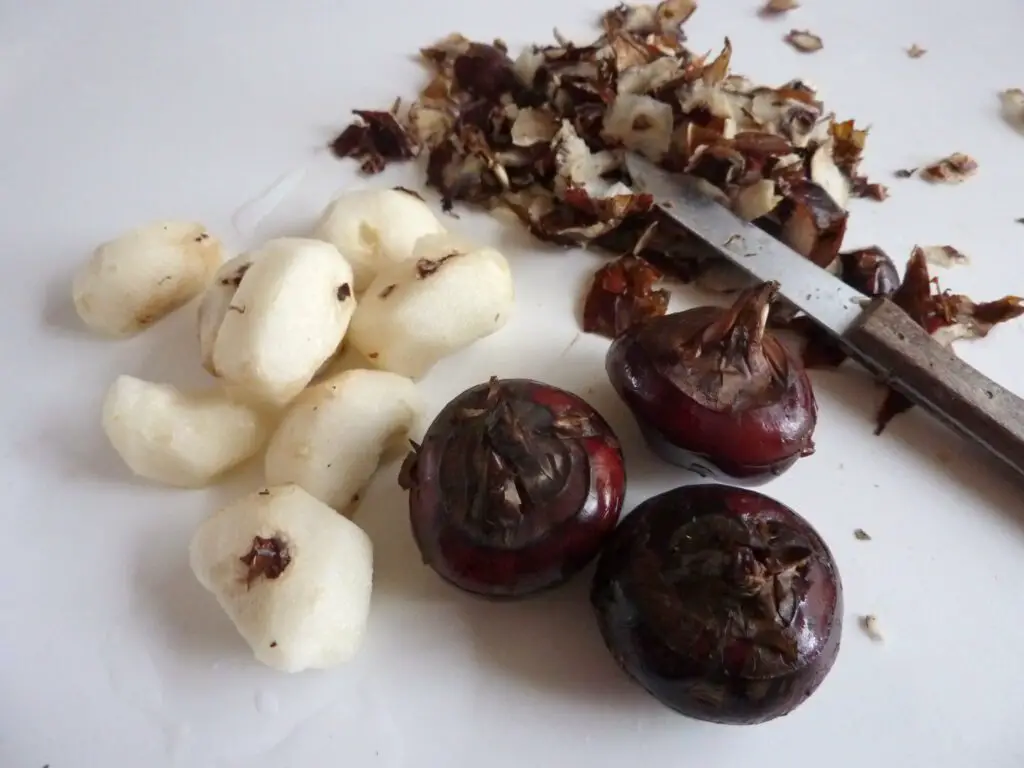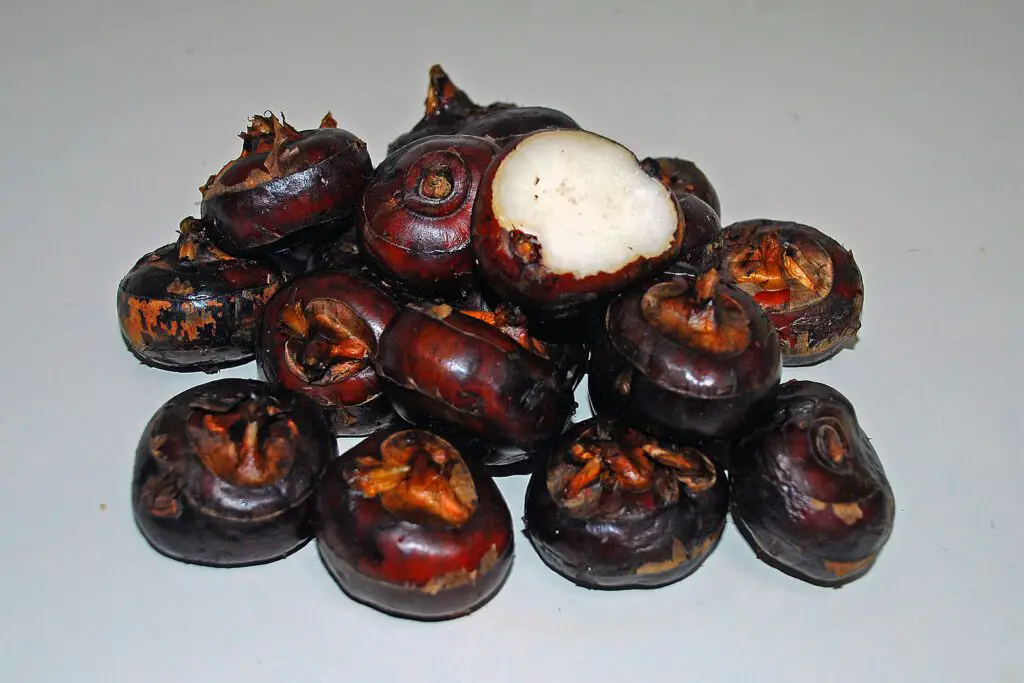As a vet nutritionist, I often receive inquiries about what foods are safe or dangerous for dogs. One of the questions that frequently come up is whether dogs can eat water chestnuts.
On one hand, dog owners are interested in expanding their pets’ diets with nutrient-rich alternatives, but on the other hand, they are concerned about the possible adverse effects of unfamiliar foods.
In this article, we will explore whether water chestnuts are a safe and healthy food option for dogs.
- Can Dogs Eat Water Chestnuts?
- How Many Water Chestnuts Can Dogs Eat?
- How Often Can Dogs Eat Water Chestnuts
- Health Benefits of Water Chestnuts To Dogs
- Potential Risks of Feeding Water Chestnuts To Dogs
- Nutritional Benefits of Water Chestnuts For Dogs
- Are Dogs Sensitive To Water Chestnuts?
- How To Prepare Water Chestnuts For Dogs
- How Fast Will Dogs Digest Water Chestnuts
- In Conclusion
Can Dogs Eat Water Chestnuts?

Yes, dogs can eat water chestnuts with the skin removed in moderation. Water chestnuts are a nutrient-rich food that contains vitamins B and C, potassium, manganese, and fiber.
These nutrients are beneficial for your dog’s overall health and can help maintain healthy digestion, muscle and nerve function, and a strong immune system.
However, it’s important to note that water chestnuts are high in carbohydrates, which means that they should only be given to dogs in small portions as a treat or an occasional addition to their meals. Also, water chestnuts should always be cooked and sliced into bite-size pieces to prevent choking hazards.
Furthermore, it’s essential to keep in mind that every dog is different and may have different food sensitivities or allergies, despite water chestnuts being safe for most dogs.
So, if your dog has not eaten water chestnuts before, it’s best to test with a small amount to ensure that they do not cause any digestive issues or allergic reactions.
In summary, dogs can eat water chestnuts, but they should be given in moderation, prepared safely, and monitored for any negative reactions.
See also: 47 Safe Vegetables To Feed Your Dog. Puppy Power!
How Many Water Chestnuts Can Dogs Eat?

The number of water chestnuts that dogs can eat depends on their size, weight, and digestive system’s tolerance.
However, it’s recommended to limit the number of water chestnuts to one or two slices per day for small dogs and up to four slices for large dogs.
Water chestnuts are high in carbohydrates, and excessive consumption can lead to an upset stomach, bloating, or diarrhea.
So, it’s essential to keep the portion size in check and observe your dog’s reaction after introducing water chestnuts to their diet.
If your dog has any pre-existing health conditions or is on a special diet, it’s always best to consult your veterinarian before introducing any new food items, including water chestnuts, into their diet.
Water Chestnuts Feeding Chart According To Size
| Food | Size | Portion |
|---|---|---|
| Water Chestnuts | Toy dogs | 1 slice |
| Water Chestnuts | Small dogs | 2 slices |
| Water Chestnuts | Medium dogs | up to 3 slices |
| Water Chestnuts | Large Dogs | up to 4 slices |
Water Chestnuts Feeding Chart According To Age
| Food | Age | Portion |
|---|---|---|
| Water Chestnuts | 0 – 6 months | Don’t feed |
| Water Chestnuts | 6 – 12 months | 2 slices |
| Water Chestnuts | 12 – 24 months | up to 3 slices |
| Water Chestnuts | 24+ months | up to 4 slices |
How Often Can Dogs Eat Water Chestnuts
In general, it’s safe to feed dogs water chestnuts occasionally as a treat or snack supplemental to their regular meals.
However, it would be best to consult your veterinarian to determine how often you can incorporate water chestnuts into your dog’s diet based on their nutritional needs and other factors.
It’s essential to remember that water chestnuts should always be cooked, sliced into small pieces, and given in limited portions to avoid any digestive discomfort or choking hazards in dogs.
Health Benefits of Water Chestnuts To Dogs
- Rich in Nutrients. Water chestnuts are a rich source of nutrients, including potassium, manganese, and fiber. The nutrients can help maintain your dog’s overall health, and strong immune system, and promote healthy digestion.
- Low in Fat and Calories. Water chestnuts are low in fat and calories, making them a healthy and tasty addition to your dog’s diet, especially for those who need to watch their weight or have specific health conditions.
- Dental Health. Chewing on water chestnuts can help your dog maintain good oral hygiene by cleaning their teeth and gums. The crunchy texture of water chestnuts can also help remove plaque buildup and freshen their breath.
- Boosts Energy. Water chestnuts contain carbohydrates that provide dogs with sustained energy to keep them active throughout the day, making it a great treat for dogs who lead an active lifestyle.
- Anti-Inflammatory Properties. Water chestnuts contain bioactive compounds like flavonoids and saponins that can help reduce inflammation and promote joint health in dogs.
- Promotes a Healthy Coat. The nutrients in water chestnuts such as vitamins B, C, and E play a crucial role in improving the skin and coat health of dogs. Regularly incorporating water chestnuts into their diet can help reduce itchy, flaky skin, and promote a shiny, healthy coat.
Potential Risks of Feeding Water Chestnuts To Dogs
- Choking Hazard. Since water chestnuts are hard and crunchy, they can pose a choking hazard to dogs, particularly small ones. It’s essential to slice them into bite-size pieces before feeding them to your furry friend to avoid any potential choking incidents.
- Digestive Issues. While water chestnuts are safe for most dogs, introducing new foods into a dog’s diet can cause digestive issues, including diarrhea, vomiting, and flatulence. To avoid any potential digestive upset, introduce water chestnuts in small quantities and monitor your dog’s reaction.
- Allergic Reactions. Some dogs may be allergic to water chestnuts, particularly if they have any pre-existing food sensitivities or allergies to other nuts. If you notice any symptoms, including itching, swelling, or breathing difficulties, stop feeding your dog water chestnuts immediately and seek veterinary attention.
- High in Carbohydrates. Water chestnuts are high in carbohydrates, and excessive intake can lead to obesity and other health conditions such as diabetes. Moderation is key when feeding water chestnuts to dogs.
- High Sodium Content. Water chestnuts can be high in sodium, which can lead to sodium toxicity in dogs if consumed in large amounts. It’s advisable to limit the number of water chestnuts to avoid the risk of sodium toxicity.
Nutritional Benefits of Water Chestnuts For Dogs
| Water Chestnuts Nutrition Facts per 100 grams | % DV * |
|---|---|
| Calories | 45 |
| Total Fat | 0 g |
| Cholesterol | 0 mg |
| Sugar | 2 g |
| Glycemic Index | 54 |
| Sodium | 67 mg |
| Carbs | 10 g |
| Protein | 1 g |
| Vitamin C | 7% |
| Calcium | 3% |
| Iron | 1% |
| Potassium | 17% |
Are Dogs Sensitive To Water Chestnuts?
While most dogs tolerate water chestnuts well, some may experience sensitivity or allergic reactions, which can manifest in various ways, including:
- Digestive Issues: Dogs that are sensitive to water chestnuts may develop digestive issues such as diarrhea or vomiting after ingestion.
- Skin Irritation: Skin irritation is another common symptom of water chestnut sensitivity in dogs. Some dogs may develop itchy, dry skin, hives, or rashes.
- Respiratory Distress: In severe cases of water chestnut sensitivity, dogs may experience respiratory distress, which can present as difficulty breathing, wheezing, or coughing. Immediate veterinary attention is necessary if your dog exhibits any respiratory symptoms.
- Swelling: Water chestnut sensitivity can also cause swelling in different parts of a dog’s body, including the face, lips, or tongue.
- Behavioral Changes: Some dogs may also exhibit behavioral changes, such as restlessness or lethargy, after consuming water chestnuts.
If you notice any of the above symptoms in your dog after feeding them water chestnuts, stop feeding them immediately and seek veterinary attention. If left untreated, water chestnut sensitivity or allergies can lead to severe symptoms and even life-threatening complications.
How To Prepare Water Chestnuts For Dogs
Baked Water Chestnuts
One of the easiest ways to prepare water chestnuts for your dog is by baking them. Preheat your oven to 375°F, rinse the water chestnuts, slice them into bite-size pieces, and arrange them on a baking sheet. Drizzle some olive oil and sprinkle some salt over the slices, then bake for about 20-25 minutes until crispy.
Boiled Water Chestnuts
Boiling water chestnuts can also be an excellent way to prepare them for your dog. Rinse the water chestnuts, peel them, and cut them into bite-size pieces. Bring a pot of water to a boil, add the sliced water chestnuts, and cook them for about 10-12 minutes until soft. Drain the water and let them cool before serving it to your dog.
Water Chestnut Treats
For a fun and tasty twist, you can make water chestnut treats for your dog. Mix together some cooked and mashed water chestnuts, oatmeal, and shredded chicken, and knead them into small balls. Place them on a baking sheet and bake them in the oven at 375°F for about 15-20 minutes until golden brown. Let them cool before serving your dog as a healthy and nutritious treat.
How Fast Will Dogs Digest Water Chestnuts
The digestion time of water chestnuts in dogs can vary depending on several factors, including the dog’s size, age, and digestive health, among others.
In general, small dogs may digest water chestnuts faster than larger breeds due to their smaller digestive systems, while older dogs may take longer to digest food.
Additionally, if your dog has any pre-existing digestive issues, it may take longer for them to digest water chestnuts.
Furthermore, how the water chestnuts are prepared can also affect the digestion time, with boiled or baked options digesting more quickly than uncooked.
Overall, most dogs should digest water chestnuts within a few hours of eating, and any undigested pieces will be eliminated during bowel movements.
If you notice any abnormal digestive symptoms after introducing water chestnuts to your dog’s diet, such as vomiting, diarrhea, or constipation, it’s important to contact your veterinarian.
In Conclusion
In conclusion, dogs can eat water chestnuts in moderation as a treat or snack in addition to their regular meals.
Water chestnuts are a nutrient-rich food that contains several vitamins and minerals that can help maintain a dog’s overall health and well-being, including digestion, energy, and coat health, among others.
However, dogs that have pre-existing food sensitivities or allergies to nuts should avoid water chestnuts, and it’s essential to consult your veterinarian before introducing them into your dog’s diet.





Leave a Reply